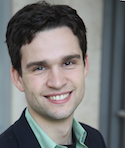ICEF/FES Research Seminar by Ben Golub (Harvard University)
 Speaker: Ben Golub (Harvard University)
Speaker: Ben Golub (Harvard University)Theme: "Social Learning in a Dynamic Environment" joint with Krishna Dasaratha and Nir Hak
Abstract: Agents learn about a state using private signals and the past actions of their neighbors. In contrast to most models of social learning in a network, the target being learned about is moving around. We ask: when can a group aggregate information quickly, keeping up with the changing state? First, if each agent has access to neighbors with sufficiently diverse kinds of signals, then Bayesian learning achieves good information aggregation. Second, without such diversity, there are cases in which Bayesian information aggregation necessarily falls far short of efficient benchmarks. Third, good aggregation can be achieved only if agents “anti-imitate” some neighbors: otherwise, equilibrium estimates are inefficiently confounded by “echoes.” Agents’ stationary equilibrium learning rules incorporate past information by taking linear combinations of other agents’ past estimates (as in the simple DeGroot heuristic), and we characterize the coefficients in these linear combinations. We discuss how the resulting tractability is useful for structural estimation of equilibrium learning models and testing against behavioral alternatives.